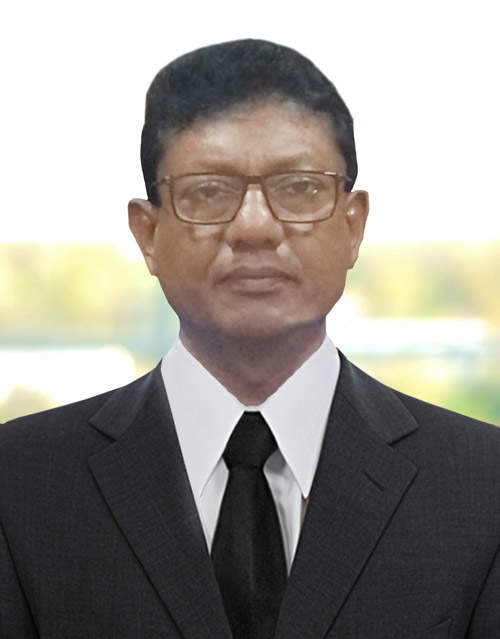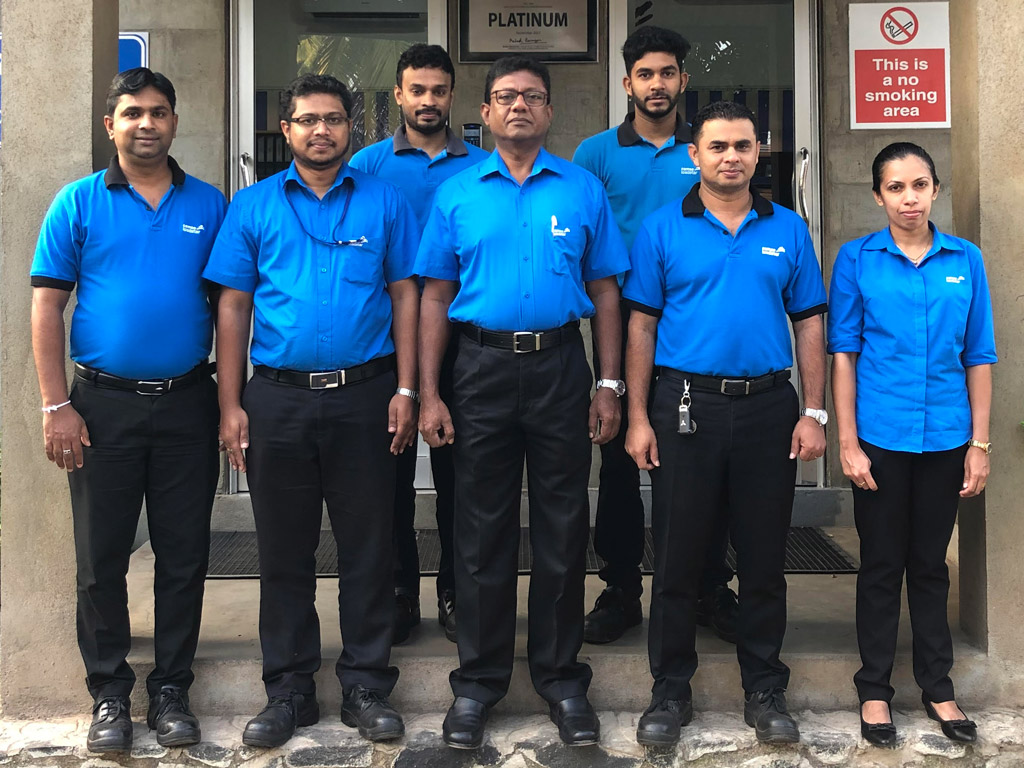Face-to-Face: Rear Admiral Gamini Mahesh Goonesekere USP, JP, (retd)
 R/Admiral Gamini Mahesh Goonesekere USP, JP, (RETD) He is an experienced Chartered Engineer with over 35 years of professional and naval experience. He has served as Director General Engineering- Sri Lanka Navy and presently serving as Director Engineering of Camso Loadstar.
R/Admiral Gamini Mahesh Goonesekere USP, JP, (RETD) He is an experienced Chartered Engineer with over 35 years of professional and naval experience. He has served as Director General Engineering- Sri Lanka Navy and presently serving as Director Engineering of Camso Loadstar.
Every organization focuses on cost cutting to maintain profitability and to remain competitive in the market. Continuous increase in cost of raw material and maintenance is challenging organizations to find ways to maintain its profitability. Camso Loadstar, a leading tyre manufacturing company, based in Srilanka, have realized the importance of Lubrication to achieve high level of reliability, increase productivity and reduce maintenance cost couple of years back and have benefitted with world class lubrication practices. In a discussion with Machinery Lubrication India, Mr. Mahesh Goonesekere–Director Engineering, Camso Loadstar tells about their journey of Lubrication Excellence.
1. What made you realize that tra nsformation program is needed in the field of lubrication in your company?
Lubrication is considered as the main blood line of machine or major equipment which has a major impact to its life time in operation. This was an area in our company which had not paid much attention during operation. With the effective root cause analysis mechanisms of our company, we found that many failures were associated with the lubrication of machinery. Therefore we realized that lack of specific knowledge of lubrication types; handling procedures and predictive analysis of lubrication were key areas which needed attention.
2. How you started this program?
 Focusing on increasing machine reliability a global initiative was taken by Camso Loadstar to establish Reliability Centered Maintenance (RCM) in 2013 with a Vision of consolidating and optimizing maintenance activities across all plants to achieve world renowned best practices. We have initiated several RCM strategies as CM MS (C omputeri z ed Maintenance Management System), PdM (Predictive Maintenance), Planning and Scheduling, etc. We came to know about Noria through internet and publications. RCM Senior Manager and I decided to attend Reliable Pla nt Conference a nd Workshop at Ohio in 2015. That was the starting point of this transformation in Lubrication Management in our organization. Subsequently, we approached Noria and VAS Tribology and requested them to guide us to achieve towards excellence in lubrication in the journey of ‘Reliability’. The major programs conducted were multiple Lubrication Technical training programs, Lubrication Program Development (LPD) – Benchmark assessment (Phase-1), Engineering Design (Phase 2), Implementation (Phase 3).These programs played a key role in transforming our current lubrication practices to best world class standard practices.
Focusing on increasing machine reliability a global initiative was taken by Camso Loadstar to establish Reliability Centered Maintenance (RCM) in 2013 with a Vision of consolidating and optimizing maintenance activities across all plants to achieve world renowned best practices. We have initiated several RCM strategies as CM MS (C omputeri z ed Maintenance Management System), PdM (Predictive Maintenance), Planning and Scheduling, etc. We came to know about Noria through internet and publications. RCM Senior Manager and I decided to attend Reliable Pla nt Conference a nd Workshop at Ohio in 2015. That was the starting point of this transformation in Lubrication Management in our organization. Subsequently, we approached Noria and VAS Tribology and requested them to guide us to achieve towards excellence in lubrication in the journey of ‘Reliability’. The major programs conducted were multiple Lubrication Technical training programs, Lubrication Program Development (LPD) – Benchmark assessment (Phase-1), Engineering Design (Phase 2), Implementation (Phase 3).These programs played a key role in transforming our current lubrication practices to best world class standard practices.
3. What were the major challenges that you faced during the transformation journey?
- Change Management
- Ownership
- Sustainability
4. How you overcome those challenges?
Change Management: This was the major challenge we have faced. Technicians were used to certain indigenous methods from inception. Convincing and training them was the main focus area. This was achieved with the assistance of Noria publication and Lubrication DVDs. In most occasions we had to repeat the same program many times to convince people. Certain practical cases were shown against the Best Practices. These activities were followed by continuous coaching at floor level. The main path to success is the willingness of our team for change. Ownership: Identifying and selecting application for lubrication handling was not considered as critical. In General it was done with basic experience. As a result we have developed and designated a new discipline in the engineering carder called Engineering Mechanic- Lubrication (EML). It was taken very positively as they engaged in knowledge upgrade and skill development with a specific identification. Further a state of the art lube storage and handling rooms were established under the guidelines of Noria/VAS Tribology. They were empowered to lead the Lubrication Program at each plant which they did with pride and motivation. Sustainability: The most essential part is continuous engagement in the program. We conduct periodical audits to measure the current state against the world class level. Gaps identified through these audits are converted to action plans and monitored for further improvements.
5. How you trained your team to take these challenges?
The Central Engineering Division – RCM Department has a technically sound team of Reliability Engineers who have the capability to implement entire program under project management structure. A special category named EML was developed to sustain the process with adequate training programs, finally evaluated with a skill assessment program. They were also trained for lube tasks and routines by the Reliability Engineers. All Reliability Engineers were trained under Noria / Lubrication Institute and certified by ICML.

6. What benefits you achieved through this program?
- Easy identification of Lubricants Camso Loastar, Srilanka facility has now incorporated world class lubrication management practices. It now offers well-equipped lube room, Lubricant Identification System (LIS), contamination control hardware and robust oil analysis program. with Lubricant Identification codes the bottom line. Now, Camso Loadstar which completely avoided cross is progressing towards the cultural contamination of Lubricants. change to enhance Lubrication enabled
- Cleanliness levels for Lube storage Reliability. rooms and across the plants where lubricants are used. It is expected and planned to reduce
- Effective Oil sampling and oil further 10% by FY 18/19, and also filtration procedures. focused to achieve ISO cleanliness
- Lubrication metrics (KPI) for levels of 16/13/09 for Hydraulic oils continuous improvement. and 19/17/14 for Gear Oils by 2020.
- World Class Lubricant Storage & Handling facilities with best practices. Our new lube room has 8. Your message to the reliability community looking for also been featured in the list of transformation in their lubrication winners of “Lube Room Challenge” for the year 2018.
- Reduced number of Lube types We are indeed proud that our lubrication from 104 to 39 without deviating program has been benchmarked by from the OEM standards. external entities and visited our facility
- Reduction in Lubricant to learn further on the subject. We consumption by 41% since 2016. would like to welcome all who are
- Gear Oil cleanliness level has interested to exchange knowledge on improved from 26/25/21 to 21/18/13 this subject and we wish to learn from and Hydraulic Oil cleanliness level them as well. This is just a beginning, improve to 23/21/14 to 18/17/12. there are many more to learn. It would be interesting to create an active blog
7. What is your way forward?
to share knowledge and comment on It is a long term journey in the journey of lubrication through a digital platform implementing best practices. Monetary which may create access to the entire benefits were obvious within shorter span of three years directly impacting community.
